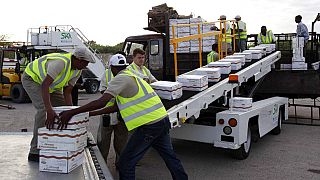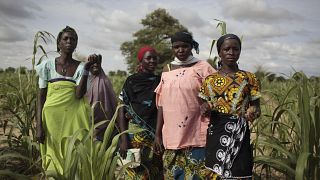Humanitarian crisis
Four months into the Russia-Ukraine conflict and ahead of the G7 summit, the World Food Programme has urged the 7 leaders to address today's record-high humanitarian needs.
In Africa, many families have shrunk their grocery bills due the high inflation aggravated by the war. If countries are impacted on different levels, all look for solutions.
"Right now, our numbers show that there are up to 345 million people, who are in hunger emergencies or war situations, Arif Husain explains. Pre-COVID, that number was only a 135 million. Of this 345 million, 50 million people are one step away from famine, not in one, not in two, but in 45 countries. That's first and foremost what we need to do is to save their lives, whether it be in Yemen, whether it be in South Sudan, whether it be in Chad, whether be in Northeast Nigeria, whether it be in Afghanistan, the list continues on and on".
Russia and Ukraine are among the world’s leading grain and fertilizer producers and Africa’s main suppliers.
Since the war erupted, the food supply chain have been disrupted. In addition to the shortage, fuel prices have skyrocketed in many African countries causing delivery issues.
To solve the looming global food crisis, the WFP chief has launched 7 calls to action. He urges the leader to commit to political solutions to end conflicts (including the immediate reopening of all Black Sea ports), ensure trade is open to deliver grains, oil and fuel and back initiatives to combat global hunger and food insecurity. He also invited the G7 leaders of the to fill WFP’s funding gap and invest in strategic development solutions that build resilient communities and foster climate actions, social protection, and sustainable food systems, allowing humanitarian and development organizations to change lives over the long term.
According to AU Commission Chairperson Moussa Faki Mahamat, 113 million Africans need urgent humanitarian assistance this year, with 15 particularly hard-hit countries.













01:24
South Sudan: World Food Programme airdrops food, warns of famine
01:00
Hamas gives 'positive' response to 60-day ceasefire proposal but says talks needed on implementation
Go to video
Paraguayan town celebrates vibrant Kamba Ra'anga festival with masks, fire and tradition
01:39
Driven to starvation, Sudanese eat weeds and plants to survive
01:47
Chinese city of Xuchang is world's biggest producer of wigs
01:41
UN warns of looming famine in Sudan, Gaza and 3 other global hunger hotspots